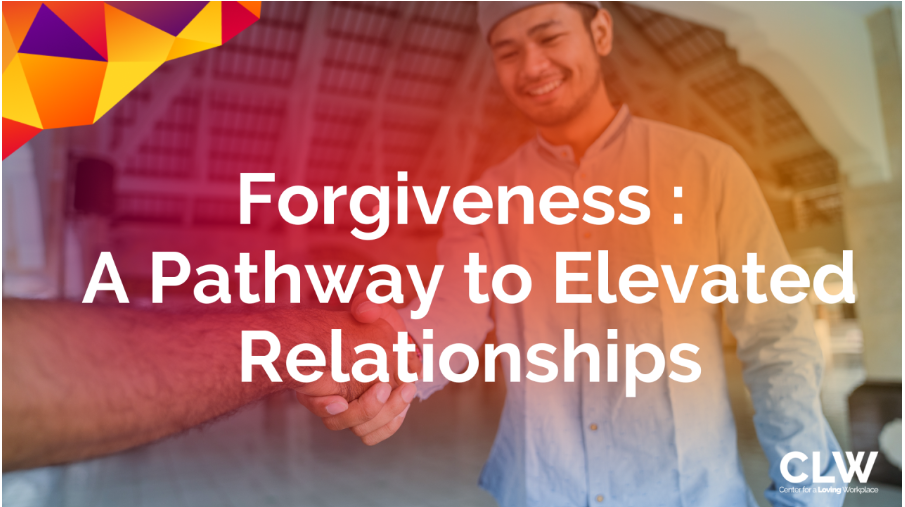Forgiveness Attitude: A Pathway to Elevated Relationships
In a recent Social Hour at the Center, we grappled with the attitude and process of forgiveness.
We looked at Forgiveness from different angles to deepen our individual and collective practice:
What is the role of forgiveness in personal growth and relationships?
How can we acknowledge and process anger to move towards forgiveness?
What's a simple process to reflect, mourn and move on?
What are the barriers and enablers to forgiveness?
How does forgiveness contribute to building healthy professional relationships and loving organizational culture?
Here are a few reflections and a synthesis of our conversation. If you'd like to be a guest at the Center's Social Hour and learn more about the powerful skills required to create a more loving work, email us at hello@lovingworkplace.org.
Embracing Forgiveness for Personal and Team Growth
Forgiveness is a catalyst for personal and professional growth. By practicing forgiveness, we’re not just letting go of past hurts, we’re also making room for learning, growth, and forward momentum. Relationships are nurtured when forgiveness is embedded in their core. To forgive is not a one-time act but a continuous practice that should be woven into our lives to help us thrive and grow.
Personal growth is about evolving beyond our limitations and barriers, and at the core of this evolution lies forgiveness. It’s an active process of liberating oneself from the shackles of past mistakes, disappointments, and hurts. When leaders embrace forgiveness, they unburden themselves, paving the way for enhanced focus, clarity, and energy. This unburdening isn’t about ignoring or diminishing the impact of past actions or experiences, but about choosing empowerment over victimhood, growth over stagnation.
In a team setting, fostering a culture of forgiveness ensures that the focus remains on collective goals, innovation, and productivity, rather than getting entangled in grudges or conflicts. When people feel safe to make mistakes and are assured of understanding and forgiveness, they are more likely to take calculated risks, be creative, and collaborate effectively.
Leaders play a pivotal role in creating this safe space by modeling a forgiving attitude, promoting open communication, and facilitating understanding among team members. Leaders who embed forgiveness within the organizational fabric nurture a culture of support, cooperation, and shared success. By adopting forgiveness as a core value, organizations can build a resilient, adaptive, and supportive workplace environment where every member is empowered to contribute their best, fostering not just individual excellence but elevating the entire organization.
Personal Leadership Practice of Forgiveness
When hurt or offended, instead of reacting impulsively, pause and identify the unmet need causing emotional discomfort. Mourn this unmet need; acknowledge the emotion without judgment. This self-connection releases the intense charge of emotions, creating space for understanding and empathy. With a calmer and compassionate mindset, connect to the person involved, seeing their unmet needs too. This mutual recognition of shared human needs fosters connection, making the path to forgiveness natural, gentle, and restorative for both parties involved.
Here are 10 steps for you to try in your personal leadership practice for forgiveness.
1: Settle Into a Comfortable Position
Find a quiet space, sit upright, and make any adjustments needed to feel comfortable. If it feels safe, soften or lower your gaze to minimize distractions and enhance focus.
2: Invite a Challenging Memory
Bring to mind a challenging past event or memory that evoked strong emotions such as anxiety, frustration, shame, or pain. It could be a personal experience or something witnessed in the media or news.
3: Focus on Your Breath
As the memory emerges, anchor yourself with your breath. Inhale and exhale deeply and calmly, providing stability amidst the arising emotions.
4: Locate the Memory in Your Body
Pay attention to where you feel the emotions associated with the memory in your body. It could be a tightness in the chest, a knot in the stomach, or tension in the shoulders. Acknowledge these sensations without judgment.
5: Identify the Unmet Need or Value
Reflect on the underlying need or value that wasn't met during the incident. It could be a need for respect, understanding, safety, or belonging. Name this need or value, acknowledging its importance to you.
6: Cultivate Forgiveness
Focus on cultivating forgiveness towards yourself, others involved, or the broader systems contributing to the situation. Recognize that everyone has unmet needs and values, and these drive behaviors and reactions.
7: Reclaim Your Power
Understand that by choosing forgiveness, you're reclaiming the power that the memory holds over you. You’re not erasing or condoning the incident but are choosing to liberate yourself from its emotional grip.
8: Breathe and Release
Take several deep breaths, imagine releasing the emotions tied to the memory with each exhale. Envision the unmet need or value being acknowledged and honored, creating space for healing and empowerment.
9: Reflect and Acknowledge
Acknowledge the courage it took to face the memory and emotions. Appreciate your willingness to move towards forgiveness and healing, recognizing this as a pivotal step towards personal growth and freedom.
10: Ground Yourself
Take a few moments to ground yourself back to the present moment. You might want to wiggle your fingers and toes, gently move your neck and shoulders, and when ready, open your eyes. Carry the lessons and liberation from this practice forward, stepping into your daily life with renewed energy and empowerment.
Conclusion
Forgiveness is central to leadership effectiveness, relationship enrichment, and organizational vibrancy. By unpacking its intricate layers, leaders can harness its transformative power, turning past hurts and mistakes into fertile grounds for unprecedented personal, relational, and organizational growth. Every act of forgiveness is a step towards a more empowered, connected, and thriving organizational landscape.
Lili Boyanova Hugh
October 2023

